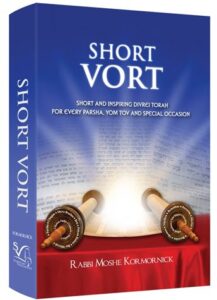“ … these are the things that Hashem commanded to do them” (ibid.).
Why, asks the Or ha’Chayim, does the Torah find it necessary to add the words “to do them”, which appear superfluous? Moreover, he asks, considering that the essence of Shabbos is to desist from work, how does the term “to do them” conform to this concept?
The Or ha’Chayim has already dealt with this latter question in Ki Siso, where the Torah writes ‘’And Yisrael shall observe the Shabbos to do the Shabbos” (31:16), where he gives numerous explanations. We might add that there ‘’And Yisrael shall observe the Shabbos” refers to the prohibitions of Shabbos (contained in “Shomor”), and “to do the Shabbos”, to the positive Mitzvos (such as Kidush [contained in Zachor]). But here, where the Torah uses exclusively the term “observe”, a different explanation is called for.
The Or ha’Chayim himself gives a number of additional answers. In one of them, he explains that it is indeed Yisrael who make the Shabbos, who transform it from a theory into practice. If they did not, Shabbos would be nothing more than an abstract term. It is only Yisrael’s keeping the Shabbos that turns it into a vibrant reality.
The basis for this explanation is a Mechilta – see Torah Temimah Ki Siso (31:16, Note 37). It seems to me that this concept fits beautifully with a well-known Medrash. The Medrash relates how Shabbos complained that of all the days of the week, it alone had no partner. Whereupon G-d replied that it need not fear, since Yisrael was its partner. And this, in conjunction with the Gemara in Sanhedrin (22b), which states that a woman only makes a covenant with the man who made her into a vessel. And it is Yisrael who make Shabbos into Shabbos.
*
The Sefomo however, sees the Pasuk in a different light, According to him, the Pasuk is not referring to the Shabbos at all, but to the six days of the week. It is as if to say that the creative tasks that the Torah is about to forbid on Shabbos (those that are connected with the construction of the Mishkan that follows) that one may perform during the six days. The Ba ‘al ha’Turim adds spice to this explanation. He points out that the word “La’asos” (to do), written as it is without a ‘Vav’, contains the letters that spell ‘Lamed Tesha’ (thirty-nine). It therefore transpires that the thirty-nine Melachos that one performs during the week, may not be performed on Shabbos.

SHORT VORT, Rabbi Moshe Kormornick. Published by Adir Press. $9.99 in stores worldwide and online here
Whether you are looking for something meaningful on the Parsha, an uplifting thought for Yom Tov, or have been asked to speak at a Simcha – “Short Vort” is the book for you! With over 140 incredible short vorts packed with stories and valuable life messages, you will never be lost for something inspiring to say.
Rabbi Moshe Kormornick is a popular writer whose words are enjoyed by thousands of readers every week.







